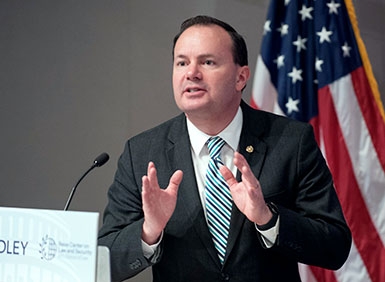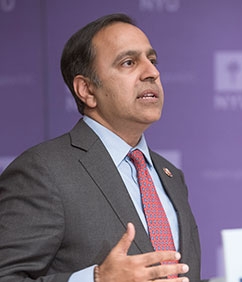Sidley Austin Forum explores balance of power between executive and congressional branches
On December 12, Professor of Practice and Distinguished Scholar in Residence Bob Bauer moderated a discussion with two other former White House counsel, Don McGahn and Kathy Ruemmler, on the executive branch’s relationship with Congress. McGahn and Ruemmler ruminated on the balance between protecting information within the executive branch and keeping Congress informed, and asserted the importance of advising the president from a legal rather than political viewpoint.
The conversation was the first event of the fourth annual Sidley Austin Forum, “Constitutional Questions and Political Struggle: Congress’ Role in Oversight and National Security.”
Co-hosted by the law firm Sidley Austin, NYU Law’s Legislative and Regulatory Process Clinic, and the Reiss Center on Law and Security, the forum took place at NYU Washington, DC. NYU Law faculty participants included Bauer, who was White House counsel to President Barack Obama, and Professor of Practice and Distinguished Scholar in Residence Sally Katzen, former administrator of the Office of Management and Budget’s Office of Information and Regulatory Affairs under then-President Bill Clinton.
Utah Senator Mike Lee delivered remarks in which he provided historical context for Congress’s war powers. US Representative Raja Krishnamoorthi (IL-08) followed Lee with remarks on the significance of Congressional oversight of private sector entities and the executive branch.
Follow the full discussion on video.
Selected Remarks:
Don McGahn: “If the lawyers get into playing political consultant, you cease being a lawyer and I’m not sure who would then listen to you for legal advice.”
25:47-25:52
Kathy Reummler: “I think every White House would like to prevent leaks from the White House or from the administration, and the reason is that leaks tend to affect presidential decision making in a way that can undermine the integrity of that decision making.”
1:17:42-1:19:21
Mike Lee: “The [Constitutional Convention] delegates instead placed [the power to declare war] in Congress, because it knew that the delegates to the Convention understood that this was the branch where open and public debate could and would happen, thus ensuring that this would be a decision of the people, by the people and for the people.”
1:35:24-1:35:40
Raja Krishnamoorthi: “Congress’s oversight powers, unfortunately, they’re implied rather than enumerated in the Constitution. But since our country’s founding, courts as well as other authorities have recognized and reaffirmed Congress’s oversight powers repeatedly.”
2:28:51-2:29:10.
Posted January 27, 2020




